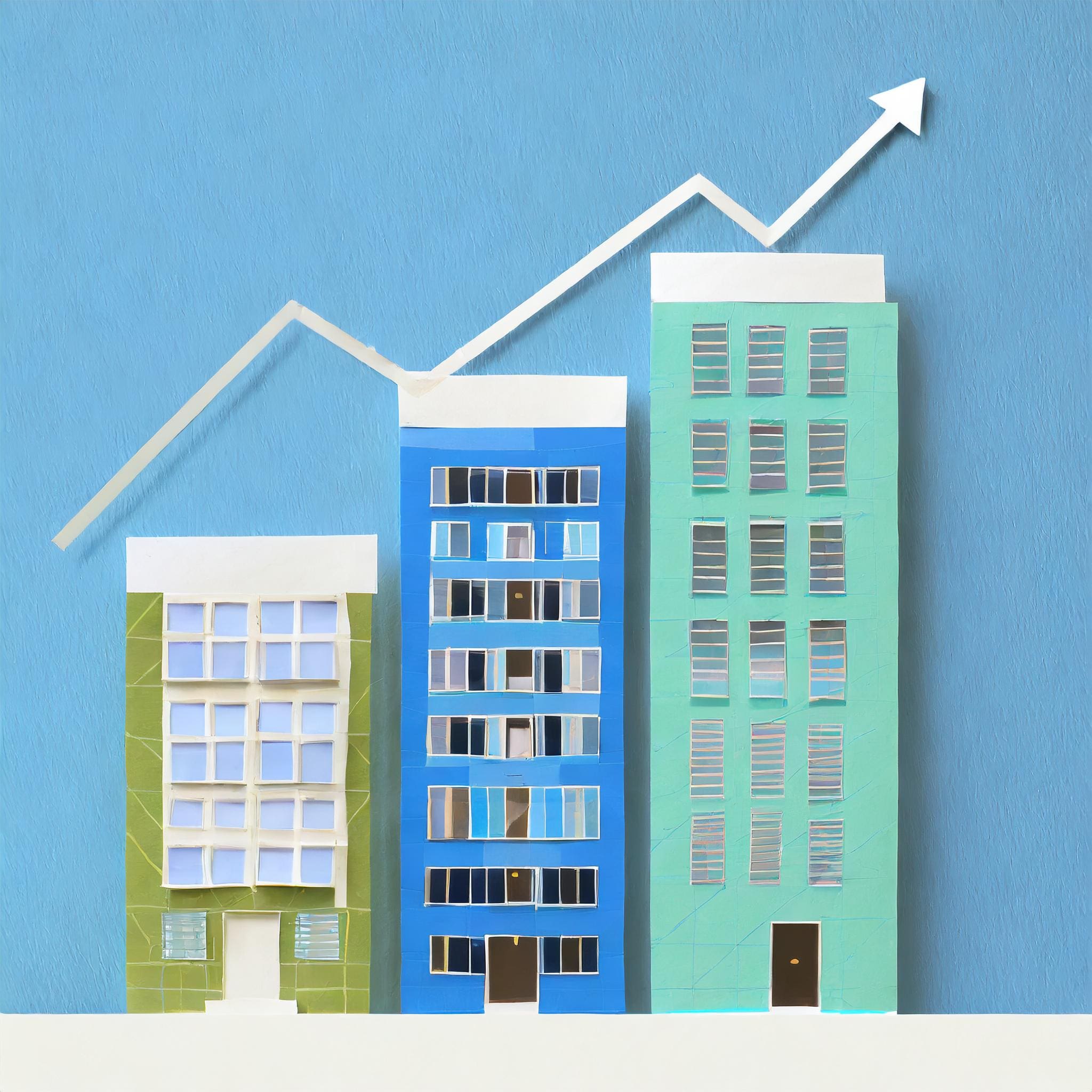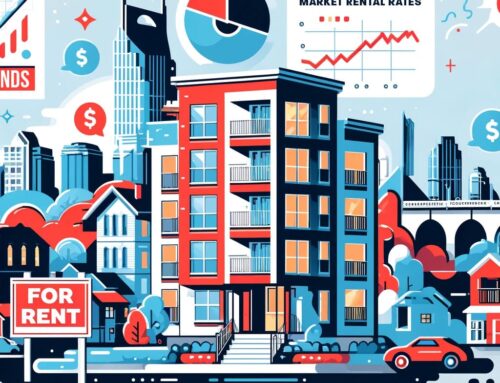In the dynamic landscape of real estate investing, understanding the nuances of rent adjustments is crucial for maximizing returns. As of 2020, rent prices in the United States have increased by a staggering 149% from 1985, with an average yearly increase of around 3.2%1. Nashville’s average rent increase per year on a 2 bedroom apartment increased 21% year over year from 2022 to 2023.2 These statistics underscore the significance of periodic rent adjustments for real estate investors. In this article, we’ll delve into the strategic aspects of raising rent, exploring how to navigate this process without losing tenants, assessing its impact on property value, and identifying valid reasons that justify rent increases.
 How to Raise the Rent Without Losing Tenants
How to Raise the Rent Without Losing Tenants
It’s often an overlooked fact that owning a multifamily property means you are also a business owner. Very few industries are expected to keep their prices the same year after year regardless of increasing costs of goods, labor and operating costs, so rents should increase over time. However the rental market does have some elasticity built in to it, meaning your renters may move out if you do raise rents too quickly. By offering some value to your tenants you can avoid costly vacancies so we recommend these 3 things:
Determine How Much Rent Increase is Normal for your market.
One of the initial steps in strategically raising rent is evaluating what is a fair rental increase and how much you can incrementally increase it without negatively impacting tenant retention. Researching local market trends using platforms like Zillow, RENTCafé, and Rentometer can provide valuable insights into fair market rents. By staying informed about comparable properties, you can make informed decisions on the magnitude of rent adjustments. You can also request a free market rent report from one of our agents today.
Rent Increases Should be an Aspect of Your Lease
Integrating rent increases as a transparent and routine element of the lease agreement can set clear expectations for tenants. Providing advance notice, offering incentives for early renewal, and explaining the reasons behind the increase are effective communication strategies to minimize tenant complaints and maintain positive landlord-tenant relationships. Ultimately you will never be able to make everyone happy and there is a reality that keeping your rents up to market standards may price your units out of reach for some people. Making rent increase annually makes them predictable and this will reduce the stress on your tenants.
Make Upgrades to the Rental and Stay on Top of Maintenance Needs
Investing in property upgrades and ensuring proactive maintenance not only enhances the value of the rental but also justifies rent increases. Tenants are more likely to accept higher rents if they perceive added value in terms of improved amenities, aesthetics, or overall living conditions. When you are scheduling your regular repairs and maintenance plans be sure to talk to your tenants about how these changes may impact their rent amount. You do not need to show them your receipts however helping tenants to connect some increase in the quality of their living space to the increase in rent will go a long way to reducing turnover.
Are Capital Expenditures Required for Raising Rents?
Upgrading facilities, enhancing amenities, or addressing maintenance issues involves additional costs, but if they bring about higher rents they can significantly contribute to the property’s overall value. Typically basic cosmetic upgrades like floors, cabinets, countertops, appliances and paint will produce a good Return on Investment. Our “Quick Tips” page has a number of suggestions on things landlords and property managers can do in-between tenants to ensure a good ROI. Small multifamily owners should always consider how long it will take them to recoup their expenditures before choosing to make upgrades.
Example: Jim owns a duplex with window AC units and baseboard heating. One of his units has an AC unit that quits working and so he has a decision to make. He can either buy a new Window unit or convert the unit to some sort of Central AC. The cost for a new window unit is $450, but installing a mini-split unit is $1500. If the mini-split unit allows him to raise rents only $25/mo it will take him 42 months to recoup those expenses.
How Does Raising Rent Impact My Property Value
Raising rents can positively impact the overall value of the property. By aligning rents with market trends, investors enhance the property’s income potential, which directly influences its valuation. Understanding the relationship between rental income and property value is essential for making informed investment decisions. Raising rents will increase your Net Operating Income. For Small Multifamily (2-4 units) the ability to cash flow is helpful but ultimately not the only consideration when banks issue loans. For 5+ units your NOI plays a crucial role in determining property value as we will see in the next section. Our “Added Value Calculator” below will make it easier for you as an investor to see the potential benefits of raising rents on your 5+ unit multifamily property.
How Does Net Operating Income (NOI) Impact Property Value
For multifamily properties larger than 4 units the Net Operating Income is a crucial metric that measures the property’s income minus its expenses. By strategically raising rents, increasing income, investors can improve their NOI, leading to a higher property valuation. Analyzing the interplay between rental adjustments and market cap rate is essential for gauging the impact on property value. Using a simple formula [(Rent Increase X Units X 12Months)/Market Cap Rate] you get a properties value. This applies only to commercial properties of 5 or more units. Therefore, a fourplex will appreciate with the market, but you cannot force the appreciation by increasing the income. So in terms of building long-term wealth, a 5+ unit is better.
Added Value Calculator
Real estate investors can leverage tools like our Added Value Calculator to quantify the potential impact of raising rents on property value. This calculator considers various factors, including unit count, rent increase and cap rate. Note: This calculator is an estimate only. Other factors such as purchasing cap rate, selling cap rate and capital expenditures will impact the actual added value
What Are Valid Reasons for Raising Rents
So you’ve decided that you want to raise rents. Doing so can be counter-productive if you do not have valid reasons for the rent increase. The rental markets in most cases are relatively inelastic in the short term with renters having few apartments to choose from and being hesitant to relocate. This means that there is some leeway for landlords to raise rents. However, over the long term, the rental market can exhibit more elastic characteristics. For example, as rental prices rise, tenants may explore alternative housing options, consider homeownership, or relocate to areas with more favorable rental conditions. Developers may also respond to favorable rental market conditions by constructing new apartment complexes or converting existing properties into rentals. For this reason it’s important to know why you should raise rents and be clear with tenants whenever possible.
 Changes in the Housing Market
Changes in the Housing Market
A fundamental principle of economics, supply and demand, plays a pivotal role in determining rental prices. If demand surpasses supply, landlords can justify raising rents, particularly if the property offers unique features or improvements over the competition. Some market fluctuations can occur suddenly, for example, as a result of natural disasters or apartment fires. Although we never condone leveraging tragedy for your profit, the reality is that these events do typically allow owners to receive market rates in the short term, but remember the market will find equilibrium as housing is rebuilt or repaired.
Interest Rates and Other Fixed Costs That Impact Rental Prices
Interest rate changes and other fixed costs, such as property taxes and insurance, can influence rental prices. Investors should factor in these variables when considering rent adjustments to maintain profitability in the face of rising operational expenses. If you have ballooning payments on your loan, anticipate these changes and do not get caught with leases that do not allow you to raise your rates. Read more about the impact of fixed and variable costs on rent prices here.
Management Fees and Variable Costs
Operating a rental property involves both fixed and variable costs, including management fees and maintenance expenses. Evaluating these costs and adjusting rents accordingly ensures that the property remains financially viable and competitive in the market. Additional people staying in the apartment can also increase the operation costs. As a landlord or property manager regularly walk your properties and maintain an accurate rentroll to avoid unaccounted for variable costs.
Conclusion
Strategically raising rent is a prudent move for real estate investors, providing an avenue to enhance property value, align rents with market trends, and justify adjustments based on valid economic factors. By incorporating rent increases transparently into lease agreements, making property upgrades, and staying attuned to local market conditions, investors can navigate this process with confidence. Leveraging tools like the Added Value Calculator allows for a quantitative assessment of the potential impact on property value, empowering investors to make informed decisions in the ever-evolving real estate landscape.




